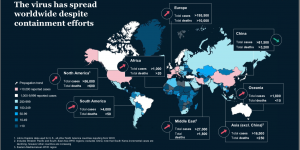“There Should Be More Than One Voice In A Healthy Society”[1]– the last words of Doctor Li Wenliang, the whistleblower to Coronavirus epidemic echoes the need for change not just in China but to the world at large. The ongoing fight against COVID-19 proves that the ‘old rules’ do not comply to the current times, as on 26 March 2020 at the virtual G20 Summit, UN Secretary General pointedly stated: “We are at war with a virus- and not winning it”.[2]
The predominant spectacle under Xi Jinping’s command is the image of a strong and invincible China; however, the current collapse of Wuhan and thereafter its global impact have put Beijing’s claims under the scanner mainly its domestic politics and Xi’s decision-making as ‘Chairman of All Things’ under severe scrutiny. The query remains: Can China be held responsible for creating such a havoc? That is, in the context of foreigners “pointing fingers” at China, Xi Jinping in his 2009 visit to Mexico as Vice President and probable successor to then President Hu Jintao categorically stated:
“There are some foreigners who had eaten their fill and had nothing better to do, pointing their fingers at our affairs. China does not, first, export revolution; second, export poverty and hunger; or third, cause unnecessary trouble for you. What else is there to say?”.[3]
Xi’s above statement seem to have faced a pitfall given the COVID-19 havoc which erupted in Wuhan and exported itself globally. Arguably, China’s claims come with conditions attached as with COVID-19’s spillover effect, the globe now faces the challenge of “flattening the curve”.
China’s lack of transparency in responding and dealing with the breeding health contingency resulted into the rapid spread of COVID-19, with Italy bypassing Wuhan as the epicentre, followed by Spain and Iran. This has significantly impacted the global order mainly witnessed in two key trends: first, transition of Wuhan coronavirus epidemic into a global “pandemic”- as declared by World Health Organization (WHO) on 11 March 2020[4]and evident from the critical indicators of the global spread of COVID-19, as shown in Map 1.
Map 1. Global Spread of COVID-19 (as of 25 March 2020)

Source: McKinsey & Company.[5]
What calls for such an health emergency are mainly four factors: (a) lack of initial awareness; (b) no adequate timely preparedness to control the spread; (c) sudden spike in infections after a stalemate and (d) shortage of medical equipment and resources (such as masks and ventilators) as well as adequate medical force- resulting into an overwhelming of health systems, as mainly witnessed in Italy and now in United States. With sustainability becoming a prime concern, it is increasingly getting tough to bring the epidemic under control suggesting that there is no quick fix to the problem.
Second, the global economy has been hit by significant distress with alarming concerns over an approaching financial crisis- making COVID-19 a contagion in a globalised economy. Increasing the risks, the impact is directly proportional to the time the virus takes to be contained. Hence, undoubtedly a long-term dent on the world economy caused by disruption of the demand-supply chain. As OECD Report suggests, the annual global GDP is projected to drop to 2.4 per cent in 2020 as a whole, from that of 2.9 per cent in 2019, added with a negative growth in the first quarter of 2020.[6] Furthermore, the global growth is expected to drop to 11⁄2 per cent in 2020- declining to half the rate as projected prior to the virus outbreak.[7]
In the arena of global foreign direct investment (FDI), as UNCTAD Report suggests the downward pressure on FDI will be -5 to -15 per cent, as compared to previous forecasts projecting marginal growth for 2020-2021.[8]Of which, the most affected sectors are mainly: the automotive industry (-44 per cent), airlines (-42 per cent) and energy and basic materials industries (-13 per cent). [9]Apart from manufacturing, travel and tourism sector is also faced with a bad hit as a result of travel bans. This downward spiralling of the global economy will have a significant impact on the energy sector. With the ongoing price war, COVID-19 has hit the global demand for oil and gas resulting into oil prices trickling to an unprecedented rate. As Rystad Energy’s report suggests, the global oil demand will contract by 16 million bpd in April and 2 billion barrels over the year.[10]
In an overall assessment of the outlined trends and the growing uncertainties, the key speculation that calls for significant enquiry is: Can immediate crisis response of each country by maintaining social distancing, imposing countrywide lockdowns, and holding commercial restrictions on travel and trade help quell the long term risks or just offer a temporary fix to the pandemic. What demands the query is the fact that no one country can champion winning over the virus, rather strongly demands a collective response. Stating that“[t]he fury of the virus illustrates the folly of war”, UN Secretary General Antonio Guterres urged for:
“an immediate global ceasefire in all corners of the world. It is time to put armed conflict on lockdown and focus together on the true fight of our lives.”[11]
Responding steadfastly to the COVID-19 pandemic, the G20 nations at the virtual summit jointly acknowledged that “the pandemic is a powerful reminder of our interconnectedness and vulnerabilities” and that it “respects no borders”- thus, pledging for “global action, solidarity and international cooperation.”[12]As OECD suggests that all G20 economies in 2020 will face a downward revision given the adverse impact on confidence, financial markets, the travel sector and disruption to supply chains.[13]In response to cropping economic risks, the G20 nations have injected over $5 trillion into the global economy to combat economic disruptions.[14]Adding to the efforts, the International Monetary Fund (IMF) and the Word Bank have jointly called for suspension of debt payments from developing countries.[15]
To fight and win by flattening the curve, the need of the hour lies in building a ‘united front against COVID-19’. Hence, time for a re-boot of the old global systems at play to fight the ‘new age’ pandemic.
End Notes-
[1] Qin Jianhang and Timmy Shen (2020), “Whistleblower Li Wenliang: There Should Be More Than One Voice In A Healthy Society”, Caixin Global, 06 February 2020, https://www.caixinglobal.com/2020-02-06/after-being-punished-by-local-police-coronavirus-whistleblower-vindicated-by-top-court-101509986.html, accessed online 26 March 2020.
[2]Aya Batrawy and Edith M. Lederer (2020), “World leaders vow to coordinate virus response in virtual G20 summit”, Press Herald, 26 March 2020, https://www.pressherald.com/2020/03/26/world-leaders-vow-to-coordinate-virus-response-in-virtual-g20-summit/, accessed online 27 March 2020.
[3] Xiao Qiang (2009), “Xi Jinping (习近平) ON FOREIGNERS “POINTING FINGERS” AT CHINA (WITH VIDEO)”, China Digital Times, 12 february 2009, https://chinadigitaltimes.net/2009/02/xi-jinping-习近平-on-foreigners-pointing-fingers-at-china-with-video/, accessed online 25 March 2020.
[4]World Health Organization (2020), “WHO Director-General’s opening remarks at the media briefing on COVID-19 – 11 March 2020”, 11 March 2020, https://www.who.int/dg/speeches/detail/who-director-general-s-opening-remarks-at-the-media-briefing-on-covid-19—11-march-2020, accessed online 26 March 2020.
[5]McKinsey & Company (2020), “COVID-19: Briefing Note ”, 25 March 2020, p. 6, https://www.mckinsey.com/~/media/mckinsey/business%20functions/risk/our%20insights/covid%2019%20implications%20for%20business/covid%2019%20march%2025/covid-19-facts-and-insights-march-25-new.ashx, accessed online 27 March 2020.
[6]OECD Interim Economic Assessment, “Coronavirus: The world economy at risk”, 02 March 2020, p. 1, https://www.oecd-ilibrary.org/docserver/7969896b-en.pdf?expires=1585314274&id=id&accname=guest&checksum=3973096C22BF163588FC1E0B4E269EE4, accessed online 27 March 2020.
[7]Ibid.
[8]United Nations-UNCTAD, Investment Trends Monitor: Impact of the Coronavirus Outbreak on Global FDI, March 2020, https://unctad.org/en/PublicationsLibrary/diaeinf2020d2_en.pdf?user=1653, accessed online 27 March 2020.
[9]Ibid.
[10]Rystad Energy, “Global Outbreak Overview and its impact on the Energy Sector”, Open Access COVID-19 Report, 3rd Edition, 24 March 2020, p. 15, https://www.rystadenergy.com/globalassets/pdfs/covid-19-report-week-13-final.pdf, accessed online 27 March 2020.
[11] “COVID-19: UN chief calls for global ceasefire to focus on ‘the true fight of our lives’”, UN News, 23 March 2020, https://news.un.org/en/story/2020/03/1059972, accessed online 26 March 2020.
[12] Aya Batrawy and Edith M. Lederer (2020), “World leaders vow to coordinate”, n. 2.
[13]OECD Interim Economic Assessment, “Coronavirus: The world economy at risk”, p. 1, n. 6.
[14] “Coronavirus: G20 nations inject $5 trillion into global economy to take on pandemic”, Business Today, 27 March 2020, https://www.businesstoday.in/current/economy-politics/coronavirus-g20-nations-inject-5-trillion-into-global-economy-to-take-on-pandemic/story/399368.html, accessed online 27 March 2020.
[15]The World Bank (2020), “Joint Statement from the World Bank Group and the International Monetary Fund Regarding A Call to Action on the Debt of IDA Countries”, 25 March 2020, https://www.worldbank.org/en/news/statement/2020/03/25/joint-statement-from-the-world-bank-group-and-the-international-monetary-fund-regarding-a-call-to-action-on-the-debt-of-ida-countries, accessed online 27 March 2020.















